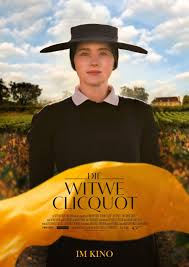![]()
USA 2023
Opening November 7, 2024
Directed by: Thomas Napper
Writing credits: Erin Dignam, Christopher Monger, Tilar J. Mazzeo
Principal actors: Haley Bennett, Tom Sturridge, Sam Riley, Christopher Villiers, Cara Seymour
 Thomas Napper uses broad brush strokes to supplement the then finer details of his film, with Erin Dignam and Christopher Monger’s screenplay, based on wine writer and cultural historian Tilar J. Mazzeo’s 2008 historical novel, The Widow Clicquot, about the eponymous founder of the renowned champagne house, Veuve Clicquot (veuve is French for “widow”). The complicated yet absorbing Barbe-Nicole Ponsardin etched out a place in history at a time when women are “coverture,” i.e., under her husband’s authority and protection. Born in 1777 the daughter of a wealthy textile manufacturer in Reims, Champayne, France, she was wed at twenty by arrangement to the neighbor’s twenty-four-year-old son, Francois Clicquot. They worked his visionary procedures into his family’s Clicquot-Murion and Son vineyard, in a compellingly futuristic partnership, including the measures Francois took before his tragic death leaving Barbe-Nicole a widow at twenty-seven with their six-year-old daughter (Cecily Cleeve). All this during Napolean’s reign and the French Revolution.
Thomas Napper uses broad brush strokes to supplement the then finer details of his film, with Erin Dignam and Christopher Monger’s screenplay, based on wine writer and cultural historian Tilar J. Mazzeo’s 2008 historical novel, The Widow Clicquot, about the eponymous founder of the renowned champagne house, Veuve Clicquot (veuve is French for “widow”). The complicated yet absorbing Barbe-Nicole Ponsardin etched out a place in history at a time when women are “coverture,” i.e., under her husband’s authority and protection. Born in 1777 the daughter of a wealthy textile manufacturer in Reims, Champayne, France, she was wed at twenty by arrangement to the neighbor’s twenty-four-year-old son, Francois Clicquot. They worked his visionary procedures into his family’s Clicquot-Murion and Son vineyard, in a compellingly futuristic partnership, including the measures Francois took before his tragic death leaving Barbe-Nicole a widow at twenty-seven with their six-year-old daughter (Cecily Cleeve). All this during Napolean’s reign and the French Revolution.
The leading performances are neatly balanced: as Barbe-Nicole, Haley Bennett’s commanding doe eyed innocence, steely strength, carefree frivolity, and passion unfold with compassion, confusion, and determined resolve, and are balanced equally by Tom Sturridge as Francois Clicquot whose emotive energy scale ranges from giggly highs to despondent, flailing lows, while Sam Riley shines as Louis Bohne, the compelling, enthusiastic local wine salesman and friend. The supporting cast is great: Natasha O'Keeffe as Barbe-Nicole’s maid Anne, Ben Miles as Francois’ father Philippe, vineyard workers Paul Rhys/Droite and Leo Suter/George, among others. Caroline Champetier’s alluring camerawork’s tonal color and impressive lighting aides Richard Marizy’s measured, fluid editing encompassing the Clicquots’ early days to when Barbe-Nicole is forced to sink or swim. Filling in that crucial period when Barbe-Nicole’s fortitude and determination defied most men’s (low) expectations concerning women, Die Witwe Clicquot’s audiences learn about this innovative thinker whose work inspired an industry and has endured generations, besides getting a generous dose about winegrowing vis-à-vis the “Grande Dame of Champagne.” 90 minutes (Marinell H.)
